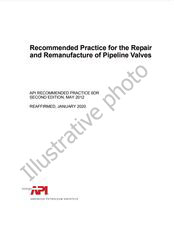We need your consent to use the individual data so that you can see information about your interests, among other things. Click "OK" to give your consent.

API PUBL 4600-ed.1995
Metals Criteria for Land Management of Exploration and Production Wastes: Technical Support Document for API Recommended Guidance Values
Translate name
STANDARD published on 1.1.1995
The information about the standard:
Designation standards: API PUBL 4600-ed.1995
Publication date standards: 1.1.1995
SKU: NS-1139773
The number of pages: 58
Approximate weight : 174 g (0.38 lbs)
Country: American technical standard
Category: Technical standards API
Annotation of standard text API PUBL 4600-ed.1995 :
API PUBL 4600, 1995 Edition, January 1995 - Metals Criteria for Land Management of Exploration and Production Wastes: Technical Support Document for API Recommended Guidance Values
BACKGROUND
The petroleum industry generates approximately 21 billion barrels per year of waste from the exploration and production (E&P) of oil and natural gas. The vast majority of this waste (98% by volume) is water produced in conjunction with the oil and gas and is typically disposed via re-injection. The balance of E&P wastes is made up of wastes from the drilling and completion of wells (< 2%) and other wastes associated with the production of petroleum hydrocarbons (0.1%) (ERT, 1987).
Drilling wastes and these "associated" wastes (e.g., crude oil-impacted soil and tank bottoms) are disposed of in a variety of ways. Often, the most economically attractive method for their disposal is on-site land application in the form of land treating (e.g., land farming, land spreading, or composting). If these types of cost-effective land application methods are to continue, it is important to under stand the nature of these wastes and the potential environmental impact from any constituents contained in them.
Organic compounds, salts and metals are constituents of possible environmental concern in drilling and associated wastes. API recommends that soil pH bemaintained between 6 and 9, soil conductivity be less than 4 mmho/cm, and oil and grease content be less than one percent in the final soil-waste mixture (SAS, 1993, 1995). In 1992, API initiated this study to address the environmental concern associated with metals found in these wastes. The level of environmental concern for a given total metal concentration is dependent on the physical and chemical state of the metal and its surroundings, which dictates the metals form (species) and mobility. The fate and impact of metals in the environment is a complex subject and, although there has been a significant body of work completed on this subject, the focus of previous studies has not been on E&P wastes.
OBJECTIVES
Practical experience has shown that many E&P wastes which contain metals can be successfully managed on-site in ways that are protective of human health and the environment. The objective of this report is to provide the scientific basis for API-recommended metal concentration limits for land-managed waste/soil mixtures. A secondary objective is to identify any knowledge gaps that may require further study to refine the suggested concentration limits.
We recommend:
Technical standards updating
Do you want to make sure you use only the valid technical standards?
We can offer you a solution which will provide you a monthly overview concerning the updating of standards which you use.
Would you like to know more? Look at this page.



 Cookies
Cookies
